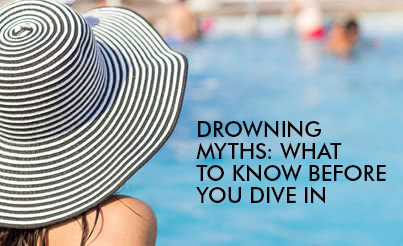Drowning Myths: What to Know Before You Dive In
June 20, 2016
By Kathleen Doheny
 More than 10 people a day die from drowning in the U.S. As more of us spend time around pools, lakes, and oceans this summer, experts say the numbers could be minimized with a better understanding of how drowning happens, who is most at risk, and why.
More than 10 people a day die from drowning in the U.S. As more of us spend time around pools, lakes, and oceans this summer, experts say the numbers could be minimized with a better understanding of how drowning happens, who is most at risk, and why.
WebMD asked four experts to debunk the most common myths they hear about this danger.
Myth: Good swimmers don't drown.
Not true at all, says James Orlowski, MD, a long-time drowning researcher and a doctor at Florida Hospital Tampa.
Drinking too much alcohol, taking drugs, overestimating your swimming ability, and rip currents -- which can pull you underwater -- are all dangerous, even for adults who can swim well, he says.
Alcohol plays a role in about 70% of drowning deaths involving teens and adults, the CDC says. Drinking affects your balance, judgment, and coordination, and those effects are amplified by being in the sun and high outdoor temperatures.
"Even older, more experienced swimmers should swim with a partner," says Kate Carr, CEO of Safe Kids Worldwide.
Myth: Dry or secondary drowning are not real.